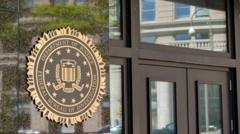The recent amendments in Australia come as a response to escalating antisemitic attacks, marking a significant legislative shift in the country.
**Australia Enacts Tough Stance on Hate Crimes with Mandatory Jail Time**

**Australia Enacts Tough Stance on Hate Crimes with Mandatory Jail Time**
New legislation introduces prison terms for hate symbols and terrorist acts amid rising antisemitism.
The Australian Parliament has approved new laws imposing mandatory jail sentences for offenses involving hate symbols and terrorism, ranging from one to six years, in a move to combat a surge in antisemitic incidents. This legislation was ratified on Thursday amid an escalating debate surrounding hate crimes in the nation, and it has been characterized by the government as the strictest anti-hate crime measure Australia has ever undertaken.
The primary trigger behind these amendments was a series of alarming antisemitic occurrences, prompting a widespread public outcry. Advocates for the new measures emphasize the importance of addressing such hate-fueled actions decisively. Under the recently passed laws, individuals who display hate symbols or perform Nazi salutes face a mandatory minimum jail term of one year. Additionally, harsher penalties await those involved in financing terrorism, facing a minimum of three years, and those committing or attempting terrorist acts, with a potential six-year sentence.
In recent months, Australian Jewish communities have witnessed several distressing incidents. For instance, authorities in Sydney discovered a caravan imbued with explosives along with an antisemitic message, only days after a childcare center close to a Jewish school was set ablaze and vandalized with hate graffiti. One particularly harrowing incident involved a Melbourne synagogue being torched while worshippers were present, creating a palpable sense of fear within the Jewish community.
Criticism towards the ruling Labor Party has emerged, with former senator Kim Carr describing the law shifts as contrary to the party's official stance against mandatory sentencing, arguing that such laws do little to lower crime rates and may perpetuate discriminatory practices. Meanwhile, opposition parties have equally disapproved, accusing Labor of hesitancy in responding to the pressing issue of hate crimes, with Liberal senator James Paterson articulating sentiments that the current measures reflect a delayed reaction from the government.
As these legislative changes take effect, with the outright ban on Nazi symbols initiated in January 2024, Home Affairs Minister Tony Burke urged lawmakers to consider the ethical implications of hate crimes, emphasizing the necessity of safeguarding every Australian's right to live free from violence and intimidation based on identity or beliefs. The ongoing dialogue surrounding antisemitism continues, as Australian law enforcement warns that the funding for such crimes could potentially originate from overseas networks.
The primary trigger behind these amendments was a series of alarming antisemitic occurrences, prompting a widespread public outcry. Advocates for the new measures emphasize the importance of addressing such hate-fueled actions decisively. Under the recently passed laws, individuals who display hate symbols or perform Nazi salutes face a mandatory minimum jail term of one year. Additionally, harsher penalties await those involved in financing terrorism, facing a minimum of three years, and those committing or attempting terrorist acts, with a potential six-year sentence.
In recent months, Australian Jewish communities have witnessed several distressing incidents. For instance, authorities in Sydney discovered a caravan imbued with explosives along with an antisemitic message, only days after a childcare center close to a Jewish school was set ablaze and vandalized with hate graffiti. One particularly harrowing incident involved a Melbourne synagogue being torched while worshippers were present, creating a palpable sense of fear within the Jewish community.
Criticism towards the ruling Labor Party has emerged, with former senator Kim Carr describing the law shifts as contrary to the party's official stance against mandatory sentencing, arguing that such laws do little to lower crime rates and may perpetuate discriminatory practices. Meanwhile, opposition parties have equally disapproved, accusing Labor of hesitancy in responding to the pressing issue of hate crimes, with Liberal senator James Paterson articulating sentiments that the current measures reflect a delayed reaction from the government.
As these legislative changes take effect, with the outright ban on Nazi symbols initiated in January 2024, Home Affairs Minister Tony Burke urged lawmakers to consider the ethical implications of hate crimes, emphasizing the necessity of safeguarding every Australian's right to live free from violence and intimidation based on identity or beliefs. The ongoing dialogue surrounding antisemitism continues, as Australian law enforcement warns that the funding for such crimes could potentially originate from overseas networks.





















